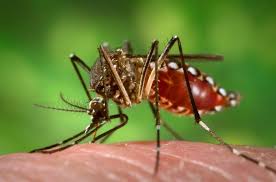 Dengue is having a free run this autumn, thanks to the abundant rains, ramapant water logging and unrestricted breeding of mosquitoes. Almost every household in and around Lucknow has either had a bout of fever in the last month or is likely to in the next one.
Dengue is having a free run this autumn, thanks to the abundant rains, ramapant water logging and unrestricted breeding of mosquitoes. Almost every household in and around Lucknow has either had a bout of fever in the last month or is likely to in the next one. Recognizing Dengue Fever (DF): It is a viral infection transmitted by mosquitoes and presents as a sudden febrile illness of 2-7 days’ duration, with 2 or more of the following:
1. Headache
2. Pain behind the eye balls
3. Severe body aches
4. Pain in the joints
5. rash
In children, DF is usually mild. In adults, it can be quite incapacitating, with associated nausea, vomiting, depression and fatigue. Dengue Haemorrhagic Fever (DHF) is a more severe form of the disease associated with bleeding from different parts of the body such as red spots or patches in the skin, bleeding from the nose or gums, passage of black stools or vomiting of blood.
One of the main concerns in Dengue is the fall in platelet counts from its normal range of above 150,000. Platelets play a vital role in preventing or stopping bleeding from small blood vessels. If their numbers fall to less than 20,000, risk of bleeding becomes significant.
The other concern is shock. Dengue sometimes causes fall in blood pressure due to leakage of plasma from capillaries with loss of blood volume. The Hemoglobin level paradoxically rises and urination may become less.
Tests for Fever: It is important to remember that all fevers may not be due to Dengue and Enteric Fever (Typhoid), malaria, and common flu are equally ramapant these days. Further, while Dengue is a viral illness with no specific medicines, typhoid and malaria need specific medications and can be far more dangerous to life than Dengue.
If fever persists for more than 2 days and is severe, tests should include Hemoglobin, white blood cell and platelet estimations, a peripheral smear for malaria, and a serological test for Dengue. The serological test for typhoid often does not show up in the first few days of this infection and hence can be misleading if done too early.
When to worry: If you have contracted Dengue, lie in bed and take rest for atleast a week, drink lots of liquids (water, juices, soups, nimboo paani or ORS), take paracetamol tablets ( upto 3 a day), avoid aspirin and brufen as they may trigger bleeding, apply balms on your head and watch TV. Consult your family physician but do not panic. Remember that there is no specific medication for Dengue and yet recovery is the rule.
Platelets and IV fluids. For platelet counts to come down is not unusual during Dengue but infusions are required only if they drop to below 20,000 or when there is active bleeding. Remember that infusions of platelets have their own risk of transmitting other infections, of allergic reactions, and their effect lasts barely a few hours.
Those with low BP and shock may need intravenous fluids to replace some of the plasma that has leaked out.
Recovery: Once the fever starts subsiding, one starts feeling better. Nausea, vomiting, weakness and low feeling may linger for a few more days. It is wise to drink lots of fluids and take life easy for a few more days before resuming work.
As published in HT City ( Hindustan Times) Dated 17 october, 2010.
No comments:
Post a Comment